
T-shirt worn by a former Pedro Pan at the press conference. Archbishop Thomas Wenski joined business leaders, community leaders, immigration advocates and former Pedro Pans in a press conference asking Gov. Ron DeSantis to revoke an executive order that threatens to close down shelters that house unaccompanied minors in Florida after they are caught at the border by immigration authorities. The press conference took place Feb. 10, 2022 in the offices of the Pastoral Center of the Archdiocese of Miami.
MIAMI | It’s a battle of propaganda versus facts, political posturing versus legal logic, Church versus state — with at-risk children in the middle.
When Florida Gov. Ron DeSantis talks about unaccompanied minors, he speaks of “clandestine” flights “in the wee hours of the morning,” and refers to the Biden administration’s “mass human smuggling operation.”
He says he wants to shut down the faith-based shelters that care for these unaccompanied minors because “I want our resources focused on the needs of Florida kids and the needs we have in our communities.”
As a result, in December 2021, he issued Executive Order 21-223, instructing the Department of Children and Families not to renew the licenses of “any family foster home, residential child-caring agency, or child-placing agency that applies to house unaccompanied alien children in Florida.”
In addition to the executive order, the governor is backing two bills now making their way through the Florida legislature — SB1808 and HB1355 — that would also prohibit “common carriers” such as airlines, from getting state contracts if they are found to be “transporting an unauthorized alien into the state.”
The governor’s rhetoric might hit the right notes politically. But Archbishop Thomas Wenski called it unhelpful and “not totally truthful” in a Feb. 7 interview with National Public Radio. Back in January, he penned a column for the archdiocesan newspapers entitled “Why is governor going after children?”
The answer, the archbishop said, is because DeSantis, emulating Texas’ governor, is trying to make the point that the Biden administration’s immigration policy is not working.
“And I wouldn’t have an argument with that necessarily,” the archbishop said. “But at the same time, we don’t make any progress by blaming the victims of a broken policy. Our immigration policy has been broken through several administrations already. And unfortunately, these children are victims of it.”
Let’s separate fact from propaganda.
The federal government has been sending unaccompanied minors to shelters such as the Archdiocese of Miami’s Msgr. Bryan O. Walsh Children’s Village for decades. There are now 16 such shelters in Florida, all run by faith-based organizations, and a total of 180 nationwide.

Archbishop Thomas Wenski joined business leaders, community leaders, immigration advocates and former Pedro Pans in a press conference asking Gov. Ron DeSantis to revoke an executive order that threatens to close down shelters that house unaccompanied minors in Florida after they are caught at the border by immigration authorities. The press conference took place Feb. 10, 2022 in the offices of the Pastoral Center of the Archdiocese of Miami.
The Children’s Village, operated by Catholic Charities and formerly known as Boystown, is the oldest in the state and probably the nation, dating back to the Pedro Pan exodus of unaccompanied minors from Cuba between 1960 and 1962. It is the only Catholic facility for unaccompanied minors in Florida, capable of housing as many as 81 children under the age of 18 who come into the U.S. without a parent — but currently housing only 50 due to COVID safety restrictions, according to Peter Routsis-Arroyo, CEO of Catholic Charities.
The work of these shelters is not, as the governor’s rhetoric implies, some surreptitious undertaking his office just uncovered. The Obama administration sent unaccompanied minors to shelters in Florida and other states. So did the Trump administration which, when faced with a major influx of unaccompanied minors, told Catholic Charities and others that “we need to expand the program,” Routsis-Arroyo said during a taping of the archdiocesan podcast, What the Faith, Miami?
In fact, when the Trump administration began separating children from their parents at the border in 2018, a lot of the children placed with Catholic Charities were younger than usual, Routsis-Arroyo said. “We had infants.”
And the minors sheltered at the Children’s Village come not just from Central America. The facility routinely houses children from Cuba, Africa and the Middle East. Often, the children are sent there because they need special care only Catholic Charities’ professional, experienced staff can provide.
LAW OF THE LAND
Why are unaccompanied migrant children even allowed into the country?
It’s the law: specifically, the William Wilberforce Trafficking Victims Protection Reauthorization Act, signed by President George Bush in 2008. The law requires the federal government to ensure the “safe placement” of minors who cross the border without a parent or guardian. Once they are processed by immigration authorities, they are transferred to the custody of the U.S. Dept. of Health and Human Services, specifically its Office of Refugee Resettlement. ORR then contracts with facilities such as Catholic Charities’ Children’s Village to house, feed, clothe, educate and care for those children while working to place them with relatives already living in the U.S.
“It is the law of the land,” wrote Matthew Soerens, U.S. director of Church Mobilization and Advocacy for World Relief, in an article published Jan. 28 in Christianity Today entitled, “Gov. DeSantis, let my ministry serve migrant kids.”
“The federal government is not doing anything illegal or nefarious by complying with its mandates,” Soerens wrote.
In effect, the shelters for migrant children which Gov. DeSantis accuses of abetting “human smuggling” are the places specifically tasked, by federal law, to keep those children safe. And who does ORR rely on to oversee those facilities? The state of Florida.

Peter Routsis-Arroyo, CEO of Catholic Charities of the Archdiocese of Miami, said taking care of unaccompanied minors has been part of the agency's mission since the 1960s. "Our license will soon expire, and unless it's renewed, unless there's some sort of understanding between the governor's office and the feds, it's possible that we will no longer be able to carry out our mission." Archbishop Thomas Wenski joined business leaders, community leaders, immigration advocates and former Pedro Pans in a press conference asking Gov. Ron DeSantis to revoke an executive order that threatens to close down shelters that house unaccompanied minors in Florida after they are caught at the border by immigration authorities. The press conference took place Feb. 10, 2022 in the offices of the Pastoral Center of the Archdiocese of Miami.
“Our license comes up once a year and we get renewed through the Department of Children and Families,” said Routsis-Arroyo. “They monitor us through the year to make sure we’re meeting best practice standards. I mean, the program is monitored to the tilt both by the feds and through the licensure with the state.”
The license for Catholic Charities’ Children’s Village comes up for renewal in March.
WHO PAYS?
Then there’s the issue of money. As Soerens wrote, the governor “knows very well that the unaccompanied migrant program is fully paid for by federal (not state) funds — and therefore does not divert from the care of local children in need of foster care.”
As a matter of fact, Routsis-Arroyo said, the Catholic Church began doing this work without any federal funding, back in the time of Pedro Pan. “We took in over 14,000 unaccompanied Cuban minor children at that time. When we did that, there was no federal program. We were not receiving any federal funds from the government. We did it because it was a part of who we are as the Catholic Church. And it’s certainly a part of the mission of Catholic Charities.”
That brings up two issues: the primacy of federal law on immigration matters, and the question of religious freedom.
The governor’s rhetoric seems to imply that shutting down the shelters for unaccompanied minors in Florida will somehow put a dent, or even end, the traffic of children across the border.
“That would be something like saying, you know, a homeless shelter is abetting homelessness because they try to give a cot and a meal for a homeless person,” Archbishop Wenski told NPR. “It’s not a logical argument on his part.”
Routsis-Arroyo puts it this way. “What’s the best way to deal with immigration in our country? Don’t start with the children. Don’t start with children, vulnerable children, crossing the border, living under horrific conditions, and not have a program in place that can offer them a safe haven.”
DESPERATE PARENTS
Both Routsis-Arroyo and the archbishop noted that the children coming today are being sent by parents as desperate as those who sent their children through the Pedro Pan program.
“Many of them are fleeing gang violence. Many of them are fleeing countries who have dictatorships, have socialist regimes bordering on communism. Many (girls) … are being sexually molested,” Routsis-Arroyo said. “They’re fleeing. It’s the parents (who) are doing this because they love their children. And there’s no stronger love than having to let go of your child because conditions in your country make it so unsafe that you’re unsure of their future.”
Another reality check: The majority of children crossing the border are coming to be reunited with parents or close relatives already living in the U.S. That task falls to Catholic Charities, the counselors and social workers who work in the shelters. They listen to the stories of the children and ensure that those who come forward to claim them — sponsors, in government parlance — “are suitable to provide for the child’s physical and mental wellbeing and have not engaged in any activity that would indicate a potential risk to the child. All sponsors must pass a background check,” states the guidance from ORR, and “must agree to ensure the child’s presence at all future immigration proceedings.”
The process of matching children with sponsors, or foster parents in some cases, takes between 20 days and two months, Routsis-Arroyo said. That’s how long the children typically stay in the shelter.
“We did a study and over the past three years, 85% of the children that have passed through our doors we have reunited with family members,” he said. “That’s a large percentage and it just goes to show that, whether we like it or not, there’s family members already here. You just can’t close the border and say you’re not going to come in. They’re going to find a way to come in, and we’ve got to keep them safe and nurtured and reunite them with family, which is federal law.”
But DeSantis also has spoken of sending these children to Delaware — Biden’s home state; anywhere but Florida. ORR records show that over 11,000 children were resettled in Florida between Oct. 2020 and Sept. 2021. For the same time period in 2017-2018, it was over 7,000; in 2014-2015, nearly 3,000. Florida’s numbers were the second most in the country, slightly higher than California but lower than Texas.
There’s a reason for that, too.
“I can also tell you a good percentage of them get reunited with family members that live here in Florida,” Routsis-Arroyo said. “Whether we like it or not, that’s the reality. So why would we close our shelter in Florida, take a traumatized child who has crossed the border, send them to Arizona or California, knowing that they’re probably going to be reunited with a family member in Florida. Why would we re-traumatize them again?”
CHURCH AND STATE
DeSantis’ actions also pose a question of religious freedom. Those usually revolve around forcing religious organizations to do something that violates their beliefs. In this case, a governor’s order would prevent a religious organization from doing something in keeping with its religious beliefs.
As Soerens wrote in Christianity Today. “After all, religious liberty is more than just the right to worship in a church building on Sunday. It is the freedom to follow and obey all the tenets of one’s religion, including caring for vulnerable children.”
“We feel we are on solid ground in terms of the service we provide and based on our Catholic faith and our Catholic, social, and moral teachings,” Routsis Arroyo said. “This is who we are and what we do. It’s in line with our mission. So you know we are going to do everything possible so that we can continue.”
The ideal solution would be for the federal government and the governor to come to an agreement that would allow the shelters to continue operating, even if the state does not renew their licenses.
Archbishop Wenski proposed that “win-win” when he and the other Florida bishops met with DeSantis during Catholic Days at the Capitol at the beginning of February.
“Even Trump voters support immigration reform; a plurality of them do,” the archbishop said. “So I don’t think it’s good politics to look like the Grinch that still stole Christmas. I would hope that we come to an agreement that allows him to save face, but at the same time for us to continue to serve these children.”
Because any way you look at it, he added, “the children are victims.”


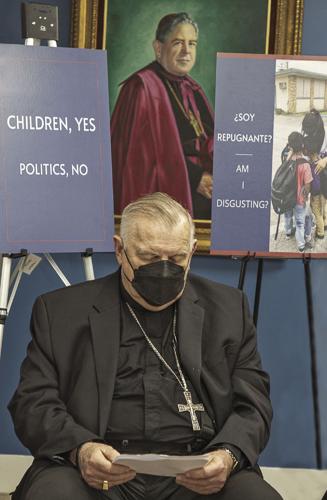
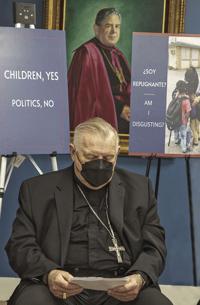
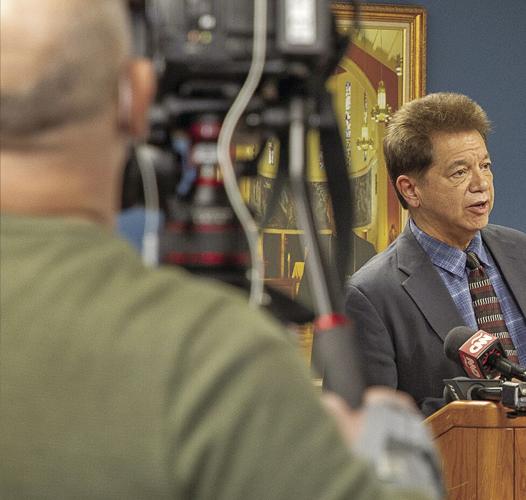
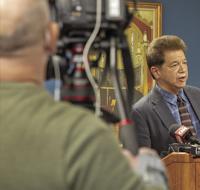

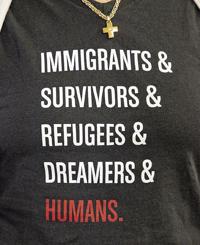
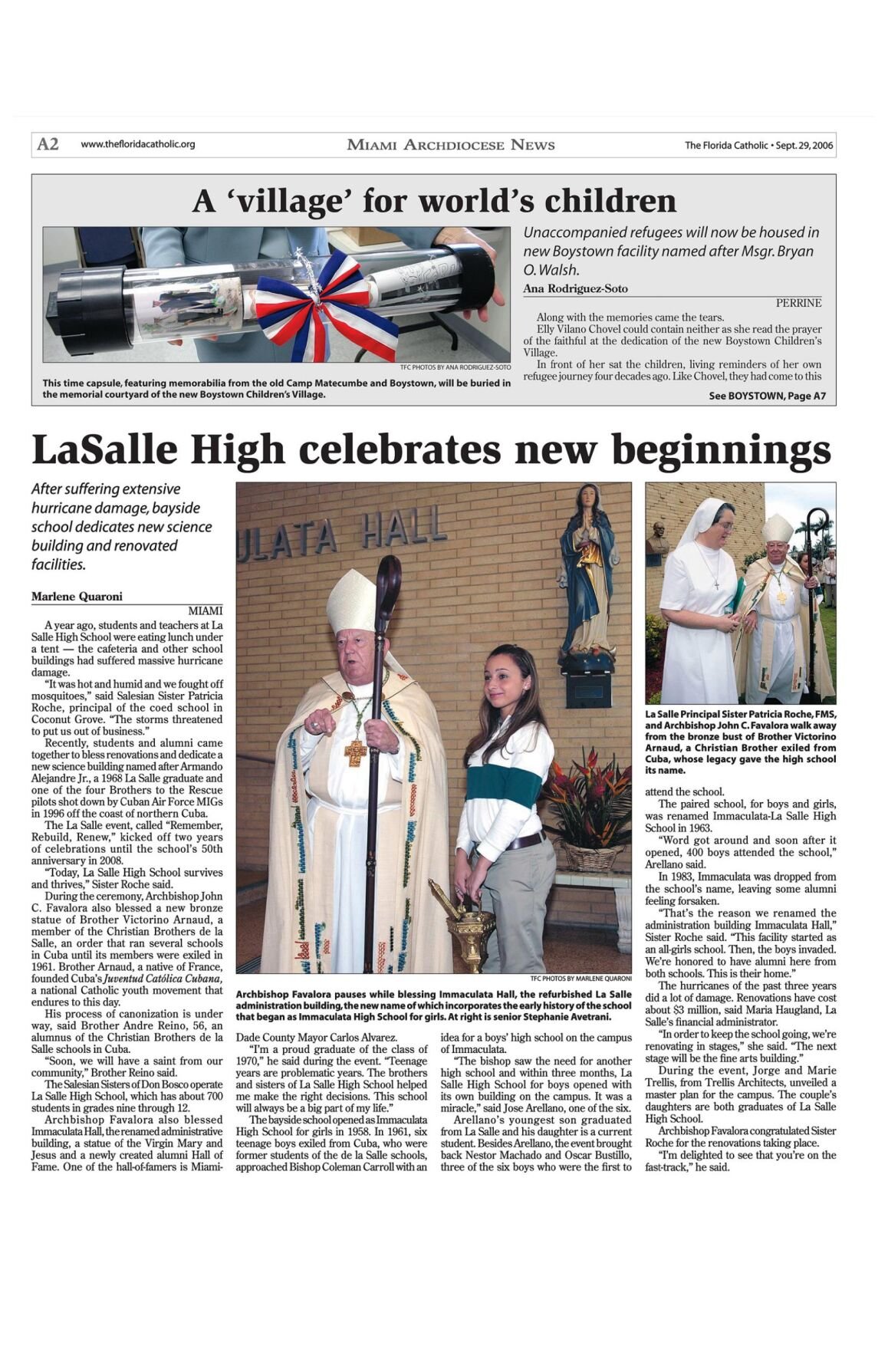

(0) comments
Welcome to the discussion.
Log In
Post a comment as Guest
Use the 'Report' link on each comment to let us know of abusive posts.